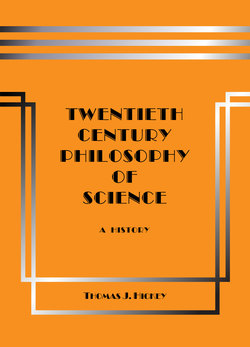Читать книгу Twentieth-Century Philosophy of Science: A History (Third Edition) - Thomas J. Hickey - Страница 121
На сайте Литреса книга снята с продажи.
Duhem’s History of Physics
ОглавлениеJust as Mach had written a history of physics viewed through the lenses of his philosophy of science, so too did Duhem. However, Duhem’s effort was relatively monumental; it is a work originally intended to be twelve volumes of which ten were actually written before its author’s death in September 1916. This magnum opus was his System of the World: A History of Cosmological Doctrines from Plato to Copernicus. The central thesis of this work is summarized in a much smaller book begun earlier, To Save the Phenomena: An Essay on the Idea of Physical Theory from Plato to Galileo (1908). His thesis is that the hypotheses of physics and especially the heliocentric hypothesis in astronomy are mere mathematical contrivances for the purpose of “saving the phenomena”.
Pope Urban VIII condemned Galileo in 1633 for maintaining that Copernicus’ heliocentric theory is not merely a mathematical contrivance, but is rather a description of the real world. Formerly known as Cardinal Bellarmine, this Pope maintained that regardless of how numerous and exact may be the confirmations of a theory by experience, these confirmations can never transform a hypothesis into a certain truth that can be taken realistically, since this transformation would require that the experimental facts should contradict any other hypotheses that might be conceived, a requirement that cannot logically be satisfied. Galileo, on the other hand, maintained that because Copernicus’s theory saved the phenomena more adequately than any alternative hypothesis, the Copernican theory had to be a realistic one.
Contemporary pragmatists agree with Duhem’s rejection of any prior ontological criteria for the criticism of scientific theory, but contrary to Duhem they furthermore agree with Galileo’s practice of ontological relativity, i.e., scientific realism. Contemporary pragmatists are realists, who let the most empirically adequate theory decide the ontology. Galileo’s argument for realism is the same as Quine’s doctrine of ontological relativity, and Feyerabend calls it the Galileo-Einstein tradition of realism. And Heisenberg invoked this tradition, when he referenced Einstein’s realistic interpretation of relativistic time in the relativity theory, and then used it as a precedent for his own realistic interpretation of the quantum theory’s duality thesis, notwithstanding Bohr’s instrumentalist complementarity principle. Duhem, however, denied that theory is realistic, and he construed Galileo’s argument as a case of the fallacy of the crucial experiment; he argued that it is impossible to enunciate all the possible hypotheses, and establish the truth of one by elimination of all others. The accomplishment that Duhem credits to Kepler and Galileo is the rejection of Aristotle’s view that celestial and terrestrial physics are fundamentally different, and that hypotheses of physics must save all the phenomena of the inanimate world.
